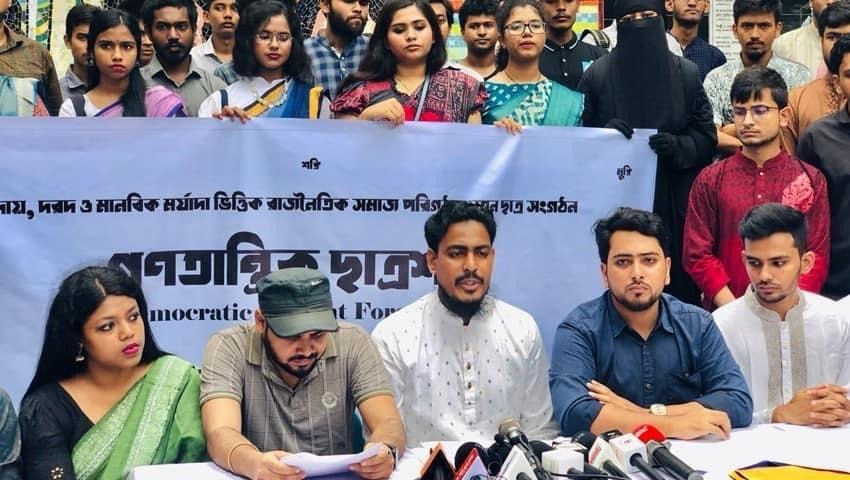As the dust of the three-week-long deadly unrest gradually settles over Bangladesh, the haze is giving way to an inescapable conclusion: that a well-camouflaged version of right-wing Islamist forces have captured state power by deploying university and college students imbued with strong anti-India sentiments.
A wide cross-section of Bangladeshi political observers and senior politicians, besides some Indian analysts, said they were convinced that the violent upsurge that began in the second week of July and continued unabated till August 8 – when an interim government led by Nobel laureate Mohammad Yunus supported by individuals from disparate NGO backgrounds – was covertly backed, nurtured and eventually unleashed on the country by US agencies and state actors.
They recalled that the first hint of a US hand in roping in the Islamist right-wing appeared on Bangladesh’s political and social landscape was around August-September 2023.This was in the form of covert interactions and meetings between US officials and the Jamaat-e-Islami (JeI) leaders.
At that time, US officials, including those from the State Department, applied pressure on the then Sheikh Hasina regime to hold “free, fair, participatory and violence-free” elections. Indeed, the JeI was allowed by the then Awami League regime to take part in protests alongside the Bangladesh Nationalist Party (BNP).
The JeI activists quietly left the venue in Dhaka before violence broke out, leading eventually to a campaign of widespread arrest of BNP activists. There were few, if any, reports of arrest of JeI supporters.
Sources familiar with US officials’ efforts to “link up” with Dhaka University teachers, including one who is now an advisor to the interim government, took shape soon after the January 7 ‘election’. “This teacher was the key man who took suggestions and advice from a Dhaka-based American official,” a source familiar with such clandestine liaisons said.
Bangladeshi and Indian officials now have reasons to believe that several students from a few private universities were recruited to undergo training at different locations in Dhaka at least a month before the “farcical” January 7 elections which ‘returned’ Sheikh Hasina and her Awami League to power for the fourth consecutive time.
The intensive training sessions were on mobilisation, organisation, articulation and ability to take quick decisions which were put into actual action even as the protests intensified. Even teachers were pressed into service to develop strong synergy between them and the students.
Well-placed Bangladeshi sources said that the deployment of students was carefully thought through on the part of the older generation of the country’s Islamist forces whose leaders were deliberately and strategically “kept behind”. This move, the sources said, was designed to put up a moderate – and therefore widely acceptable – image of the students among the Bangladeshi at large.
In this context, sources said that most of the 64 coordinators of the students’ movement and protests have Islami Chhatra Shibir (Jamaat-e-Islami’s students’ front) backgrounds, which casts a shadow on the ideological leanings of the activists.
Bangladeshi political sources said that one of the main student leaders, Sarjis Alam, is in reality a Chhatra League activist who was not picked as an advisor in the interim government for his perceived Awami League links.
What is alarming is that decisions taken in the PMO, when Sheikh Hasina was still in command, would be immediately transmitted to the student leaders who would use this to their advantage to quickly “upgrade” their demands and continue to keep up the pressure on the Bangladeshi authorities.
Additionally, several sources pointed out that some advisors to the interim government head, Mohammad Yunus, have had serious disagreements among themselves on a number of issues.
One such advisor is Dr Bidhan Ranjan Roy, who previously worked as a psychiatrist in government medical institutions during the Hasina regime. Roy, the sources said, is said to have expressed reservations about the character of the students’ movement, its way forward and objectives.
Other experienced Dhaka-based academics and social development sector experts, including economists, also stayed away from having truck with the Yunus-led panel for they too were “uncomfortable” with dealing persons who adhere to a “particular kind of ideology”.
Some of the key individuals now in leadership position in the Yunus dispensation are not known to have completely clean slates, especially in matters of past financial dealings. At least three members of the interim government were faced with cases of financial impropriety in the past.
One of these, Supradeep Chakma, a Bangladesh foreign service officer, misappropriated large sums of money when he was posted as a diplomat in Mexico. He was chargesheeted by the Bangladesh Anti-Corruption Commission (ACC).















